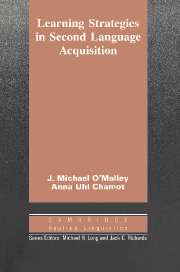Book contents
- Frontmatter
- Contents
- Series editors' preface
- Preface
- 1 Introduction
- 2 A cognitive theory of learning
- 3 How cognitive theory applies to second language acquisition
- 4 Learning strategies: methods and research
- 5 Strategies used by second language learners
- 6 Instruction in learning strategies
- 7 Learning strategies: models and materials
- 8 Summary and conclusions
- Glossary
- References
- Author index
- Subject index
2 - A cognitive theory of learning
Published online by Cambridge University Press: 05 October 2012
- Frontmatter
- Contents
- Series editors' preface
- Preface
- 1 Introduction
- 2 A cognitive theory of learning
- 3 How cognitive theory applies to second language acquisition
- 4 Learning strategies: methods and research
- 5 Strategies used by second language learners
- 6 Instruction in learning strategies
- 7 Learning strategies: models and materials
- 8 Summary and conclusions
- Glossary
- References
- Author index
- Subject index
Summary
This chapter describes the rationale for advancing a cognitively based theory in second language acquisition and presents the foundation for the theory as it relates to constructs that will be discussed in later chapters. We suggest that second language acquisition cannot be understood without addressing the interaction between language and cognition, and indicate that at present this interaction is only poorly understood. Second language theorists have not capitalized on the available body of research and theory that has already been worked out in cognitive psychology. The chapter first identifies second language processes as having parallels with the way in which complex cognitive skills are described in cognitive theory. Aspects of cognitive theory are discussed that relate to memory representation and to the process of acquiring complex cognitive skills. The theory on which we rely most extensively is augmented in order to describe more adequately processes that occur in second language acquisition. We go on to discuss the way in which cognitive theory addresses specific language comprehension and language production processes, and conclude by indicating that cognitive theory can extend to describe learning strategies as complex cognitive skills. Finally, we introduce the major types of strategies on which we rely in later chapters.
Background
The fields of linguistics and cognitive psychology each contain separate paradigms for describing second language acquisition. Linguistic theories assume that language is learned separately from cognitive skills, operating according to different principles from most learned behaviors (e.g., Spolsky 1985).
- Type
- Chapter
- Information
- Learning Strategies in Second Language Acquisition , pp. 16 - 55Publisher: Cambridge University PressPrint publication year: 1990

